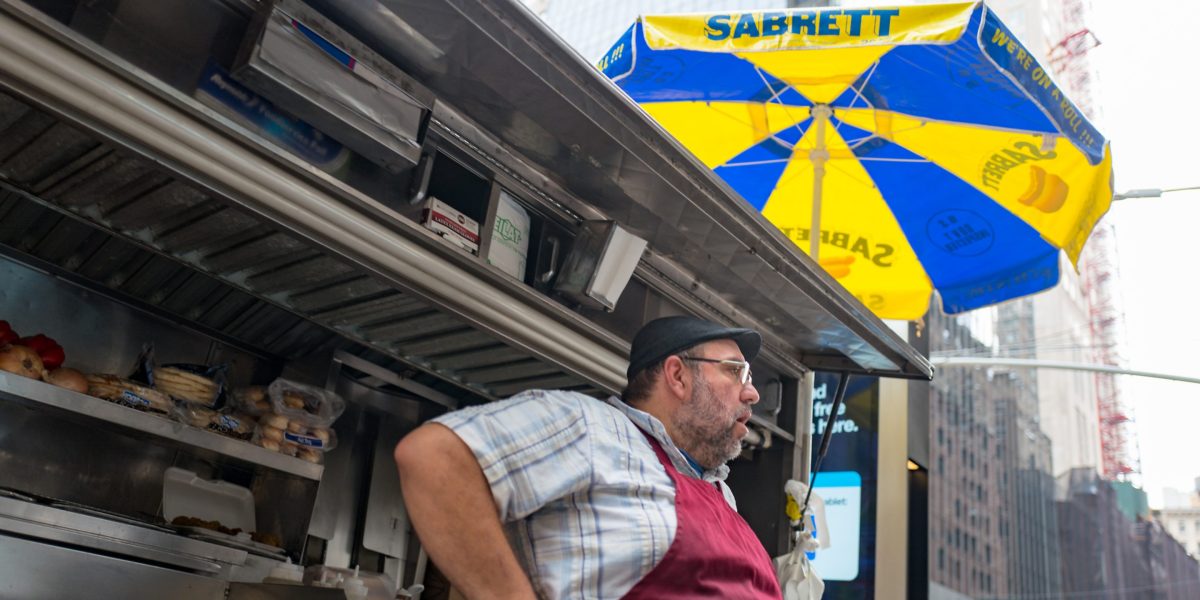The 8000th “Covid killed cities” article, just shifting the goalposts and jumping around to different cities with different metrics out of context to make it seem worse than it is.
Walmart, suburbs, and the Internet killed downtowns IMO.
Capitalism killed cities, not COVID.
Urbanization has been increasing globally for hundreds of years. Nothing killed cities.
Therein lies your problem – USA is just barely civilized.
cars kill cities
They do too, but the cost of living (a problem exacerbated by capitalism treating property as an investment) has pushed workers out of cities, which kills the ability of businesses to keep employees, and thus the downtown empties of businesses like restaurants.
Are you saying that you don’t think cities are having issues?
I’m saying cities aren’t dying. Cities reinvent themselves when they have issues. Oh no, the textile industry is leaving NYC after WWII and the area those factories were in is considered a slum, the city is dying… and now that area is SoHo.
If this article was just trying to say “cities are still working their way back to pre-covid commercial activity levels” then sure, there is a temporary issue from a generational pandemic, agreed. But if you think people are going to stop moving to cities long term you are just wrong.
I mean the author is basically saying what you’re saying. the title definitely left off a keyword from the title : "[Traditional] Downtowns are dead, dying or on life support… " with their definition of traditional downtowns being only business focused downtowns, rather than muxed usage downtowns
Gotta agree. I travel extensively and have seen downtrodden town centers as well as vibrant ones. There are multiple factors, not just “white flight” which has had decades to be mitigated or shift culturally. One of the truths is that people are generally moving to urban areas. That’s where the jobs are. That means leaving small towns. However, if that small town is near an urban area it stands a good chance of getting an economic boost as move in or people looking to “get away” dump money into the tourist market. Yeah, crime and poverty do a lot to keep economic improvement away, but even places like Oakland in California, a hotbed of crime in the ‘80s/‘90s, has seen an economic boost and an overall improvement as rising property values made the area more desirable. Towns will grow or shrink as economic opportunities leave or arrive.
There are going to be winners and losers, but the general trend is that urban areas are still going to be the bigger beneficiaries.
How much of the boost in Oakland was from SF just getting expensive as fuck to live in?
Quite a lot. I didn’t want to make a pedantic and exhaustive list of economic causal factors, but buyers being outpriced in a nearby area forcing them to look at previously undesirable areas can certainly be a factor.
Interesting, nah you’re good man. Not from the area nor a field anything about, just was curious
One of the most-striking experiences of my regional metro core’s death throes was needing to pee but my train was delayed. Tried walking across the way to the local train station to use their facilities but the security guy they’d hired to keep the homeless out about fought me to keep me from using the restroom.
If you wonder why your city streets and transit zones smell like piss, it’s because when you lock up your bathrooms to keep the homeless people away, they’ll piss on your street
You think it would be obvious but for some reason. I’m not sure if I have IBS or something, but I am always on the look out for bathrooms and they are so hard to find downtown.
In the town that we spent our summers in, there was a single, well hidden, public restroom on Main Street. This is a town that makes their living on tourism. You would think they wouldn’t want people have quit shopping and leave downtown to pee.
In the middle of the 20th century there was a huge migration of people out of city centres and into suburbs. Some of my relatives bought up properties back then and made bank when the city expanded. I don’t expect inner cities to remain quiet forever, but the way they’re used might change.
huge migration of people
White people. Because due to desegregation, they were suddenly required to have black people in their neighborhoods if those black people wanted to buy a house there. So they ran away from the black people.
Not everyone lives in the US. While aboriginal people in Australia also tended to stay in the inner city they make up a much smaller proportion of the population, and the divide between city and suburbs was more along socioeconomic lines than racial ones; it just happened that due to racism the Aboriginals were in the lower socioeconomic group.
Shock and horror… White people mooooooved…
No one said it was shocking or horrific. Just typical systemic racism.
Redlining is systemic racism, people choosing to move away is just regular old racism.
The biggest draw major cities can implement is not designing their city centers around cars.
Cities could be like amusement parks, not whatever they are now.
Makes sense. Downtowns are commercial districts with few, if any, residential buildings. Restaurants exist there to feed the various workers. Workers will shop after work or bring family/friends/dates to the area because it’s something they know or are familiar with.
With WFH, no one has a reason to go to downtown. Cost of living increases already make them think twice about doing so.
All in all, we’re seeing a shift from specifically zoned districts to mixed use downtowns. This means smaller stores, more walkable or mass transit focus. These cities will just need to incentivize conversion of these downtowns to include more residential structures.
we need statewide laws, preempting any local zoning laws, that allow dense residential buildings with no parking minimums in any zone that allows office uses.
Disabled parking should always be required. Not everybody can take public transit, or not without it being unreasonably burdensome and/or dangerous (think immunocompromised people for transit being dangerous).
paratransit vans have been a thing for a long time and solve this issue. the amount of traffic they cause is negligible. just follow ADA rules for disabled parking with the spaces you do end up building and don’t worry about it. disabled people are much less likely to own a car in the first place than the average person, so privileging cars does them no good
Here here
Zoning is only useful for the type of place that isn’t built to keep harmful emissions confined to their land. Farms (manure smell), and some chemical industry apply and should not have housing at all. Farmers will be shocked to learn I just told them they need to move to town.
What cities are preventing downtown residential construction? All the office construction was because it was more profitable. Cities are already bending backwards to developers.
Statewide laws preempting local laws is how you consolidate corruption most effectively. We added a half cent local sales tax to permanently end toll roads 30ish years ago and the state went ahead and overruled it. We still pay thebextra half cent AND they just added ANOTHER goddamn half cent.
Florida is purple but all the state sponsored corruption, racism and meth cna sure make it seem red.
here in cali the state’s suing cities for not allowing enough housing to be built, which is literally the cause of half of everything that’s wrong with the state
I can understand that but at the same time, it can also counteract a lot of localized perverse incentives. The majority of people might want more housing, but then at the same time there’s a significant part of the voting population (especially at a municipal level) that doesn’t want it in their community because of unfounded fears of higher density, so everybody wants it somewhere else and it doesn’t get done. Well, if you go up a level of government, it’s going to get done everywhere fairly, and people finally realize that it won’t be a problem.
Until you realize that moving it up a level means it is much harder for the individual to affect change. Higher levels means rich people have their say because they can afford to lobby for their say. At least local initiatives can be engaged with by local individuals without the need for a massive warchest to fight entrenched interests. Fight these things locally rather than kicking the can upstairs and hoping the good parts trickle back down.
I strongly think your take is ass backwards as a long term strategy, even while you can affect some short term wins. Republicans are taking over at the state level to push abortion bans, book bans, education limits, pay for religious education with public funding, eliminate equal rights, push conspiracy nonsense, enact voter suppression schemes, push pure propaganda as an educational standard, and on and on. They can’t affect these changes at the municipal level, only by grabbing power away from the local level. There’s a lot more happening in a cumulative manner that needs to be fought against than to be primarily concerned over than local rich landowners and NIMBY fuck-os trying to assert their real estate whims.
Poorly planned cities no surprises there.
Good. Much like malls, big cities are a thing of the past. People don’t want that anymore, cities are hell to travel around, dirty, stinky, expensive and unsustainable. Most people would have a vastly better time in a well developed small/mid town area.
removed by mod
No. We’re sick of subsidizing suburbanites, like we have been for the last 80 years. Get with the times, or live in the country and leave your car at the edge of town.
I’ll just park at the big park and ride lot at the edge of town…oh wait, there aren’t any.
You’ve correctly identified the weakness in our infrastructure. Now, let’s push to get it done, yeah?
That sounds great until I start thinking about how to make it happen in a country where so much of the political and economic power is controlled by interests that are actively hostile to anything that would improve the lives of normal people.
Nobody said it was easy, but the alternative is give up and die. Personally, I’m too spiteful to accept that.
I mean this is kinda the point. No one with a car wants to go into a downtown with no parking. And as people have figured out WFH, and way more people need to lower costs and stop paying so much for food. And shopping without a car is a PITA, I did it a couple times in college. Completely unworkable to go shopping once a week. I don’t want to spend my life daily going to the store. And now you can get everything delivered. So shopping is down to ‘event shopping’ like Macys at Christmas. Similarly for eating out, no one is looking to spend 40 for 2 at a subway. So if you’re spending lots of dollars you might splurge rarely and only go to high end restaurants killing off diners etc.
And people still find all this cheaper than living in cities. The rent and all other costs have been out of reach for decades. So like so much else, people need lower prices which seems unlikely, much higher wages, also unlikely, or cities continue to hollow out.
It’s not even the first time cities have hollowed out.
“Will the last one leaving please turn off the lights”
If you drive downtown is not the place for you. Once you figure out how to take a bus (which may not even be possible, and often is harder than it should be!) downtown can be a nice place .
Making cities even more anti-human hellscapes is why nobody wants to be in a city in the first place. There needs to be MORE of the things you want to get rid of. You’ll be more likely to visit their diner if walking past the diner, and the cafe, and the pub is a pleasant experience. Local business dies when places become destinations spread out by a concrete mile of car infrastructure because you can’t window shop from a car. Other countries figured it out a long time ago.
removed by mod
Yeah thats what we need now, less bikes and even more cars
I can’t afford food for myself, and every day gets worse and worse, I’m sure I’m not alone, this is what happens when you let the working class go so far down the hole all they can afford to do is work and sleep.
Are you living in the US by any chance?
Yep.
After moving from the US to Europe there is something magical about walking around the city and town centers here. Not just the tourist traps like Rome and Paris but smaller towns and villages with tiny narrow streets lined with shops and restaurants and people walking around. So much better than the souless shells our downtowns have become in the US.
Of course they are nice to walk through, people wouldn’t have lived there for thousands of years if they weren’t.
People have lived for thousands of years in Cairo
Subtle. Very good.
Wait, is this another trick to make me go back to the office?
I wouldn’t say thats what it is, but it is used for that
I have a strong hatred for how many storefronts are taken up by “antique shops” (i.e. dusty warehouses full of junk you couldn’t give away) instead of actual businesses in the last two small towns I lived in. Makes it so you can’t really get that much shopping done downtown.
Don’t hate on the antique shops. Hate on the big box stores that everyone goes to shop and has left the only possible business for a small store to become an antique shop.
EDIT: Also fuck dollar general
The tax write off shops for bored housewives needing something to do.
Modern downtown includes residential developments - live and work without the need for a car.
How the fuck does this article define “downtown”? Can’t find an explanation in it.
I don’t think it’s something that needs to be explained.
You can look up for yourself what downtown means if you’re confused.
In my small town (15K) in MA, we call it “uptown” and it’s doing great!
Small theater with plenty of live events. Well used library. New brewpub in the old fire house. New sushi joint. Brand new ice cream shop. Small, but, functional dessert bakery, Pho shop, and soon a new butcher/seafood shop.
Throw in other restaurants, pizza joints, barber, salon, liquor store.
Plenty of people living right there also. It’s a very successful New England “village”. There’s even a really nice band stand on the center park where they have all types of activities. Free concerts every Thursday night during Summer and Christmas caroling the Thursday before Christmas.
That actually sounds cool. My experience with downtown areas has been less than positive… more of a maze, everything very overpriced… now that I think about it it’s very similar to a large airport.
Shame as it’d be nice to just walk around for all your needs… you’d think it would actually be more cost effective.
I pray you guys never get a walmart
Definitely not in town center. There are 2 Walmarts within 15 minutes. 2 Targets also within 15 minutes.
We also have a NFL stadium in town. It is very isolated in the business/commercial district.
I’d bet over a million people have been in town and never visited the center of our quintessential New England village.
We have a dramatic shortage of residential property. We have a dramatic oversupply of commercial property. IF ONLY THERE WAS A SOLUTION
For the millionth time it’s not that simple. Retrofitting commercial buildings is often impossible or more expensive than just demolishing and building new which is also ungodly expensive especially with how high interest rates are right now. Unless cities step in with millions of dollars per project it’s usually not financially possible.
Retrofitting commercial buildings is often impossible or more expensive than just demolishing
That sounds like a “them” problem.
They can watch their investments dry up and lose billions, or pivot to the new market. Not our fault they’re stuck in the 80s.
If the problem is money then there is no problem. It becomes a necessity and you can’t just not afford necessity. We allegedly are the richest country they need to figure it out regardless of cost. That simple.
It’s like climate change, there is no issue with money it just has to get done. Pay for it regardless of the cost. It is necessary
But what if we let the children pay for it when they grow up? Yes, the cost will be several orders of magnitude more, but we don’t have to think about that now.
Just jubilee the debt away? Bro money is fake, who cares?
I mean, hopefully fewer people from the future generation will be homeless. It’s pretty rough starting out now, especially if you aren’t lucky enough to have a wealthy family.
What we’ve been doing for the last number of years just isn’t working. The solution isn’t to keep procrastinating it indefinitely. There has always been debt that’s pushed onto future generations, but this debt might actually help them.
I wish that people started building more housing many years ago. If housing was cheaper, increased taxes wouldn’t be as big of a concern. This is because there would also be more money available to spend. This means spending money for food, transportation, schooling, and more.
Instead, currently many people are using the limited housing as investments and retirement plans. Life expectancies are increasing, and births are still happening. Where do you propose people live if there isn’t housing available?
Rural forests in uninhabited areas also aren’t a legitimate option for most people. No running water, no heat, no medical care available, no pharmacies, no stores, no places to work, and nowhere to buy tools to build shelter. That sounds like a very bad time for most people.
deleted by creator
It’s more than that though, where do you bathe in an office?
I’m not saying it can’t be done, but it’s a lot of work to redo the plumbing, electrical, install kitchens, and seal those spaces into secure private zones with natural light exposure.
What I hear is mostly water pipes. Commercial buildings have them concentrated in bathrooms and hard to split for each residence.
I know there are bathroom less really cheap places but that attract type of people which property management/urban development corps dont want so they may also be reluctant for that change.
I live on the North end of the SF Bay Area and literally every empty lot and a shit load of pasture land and open space is currently being developed into either low income apartments, high end apartments, town houses or track homes. It’s honestly kind of shocking. Everywhere you go, new residential development.
Sonoma County supervisors were supposed to vote on a housing development plan in January, but failed to do so until August, and in the meantime there was a special rule that allowed builders to go ahead without most of the red tape they usually face. They took the opportunity and ran with it.
This is such bullshit. It doesn’t cost millions of dollars to add new plumbing, HVAC, and interior walls.
Say you have an average size house, with a 2-car garage on the side. You decide to change that garage into a small apartment for renting. You need to add a wall or two, add insulation, build up a kitchen area (with proper water and power) and a bathroom.
Imagine how much that would cost you for that single apartment. Now multiply that by, say, 50, to convert a large office building into 50 residential rental units. Even with economies of scale, that’s still going to cost millions…
Dude… you’re arguing that it’s better to tear down, and build from scratch then it is to retro fit. This is obvious bullshit. In your example it would be more practical to retro fit the garage then to tear it down, and build a new building. Like fuck man.
“ In parts of the country where land is relatively cheap, it’s far less expensive to build housing from scratch than to convert old offices.”
Actually it’s not bullshit. Most office buildings are designed with large core space where the elevators and stairs etc go. That’s not at all how apartment buildings are designed. Changing that is extremely expensive.
Unfortunately, in most cities that is illegal. Zoning laws prevent turning commercial property into residential even when it is possible. It also prevents developers from building moderate, high, and even certain types of low density housing.
In most US cities. Hmm, I wonder if we can spot a solution…
Be careful what you wish for. Houston is notorious for abolishing its zoning laws, which means that residential and commercial properties are haphazardly scattered rather than concentrated into distinct areas.
People never know when a CVS will pop up next door to their home. Now you know why they form HOAs.
IF ONLY THERE WAS A SOLUTION
Middle managers: I agree. From now on you’ll be required to be in office 4 days a week instead of 2!
if only there was a solution that wouldnt immediately destroy billions of dollars in commercial real estate.
you have to remember that office space cant be easily converted into residential space. most standard office floors dont have more than two or maybe 3 restrooms. cant imagine that many people would be willing to share a public bathroom with their neighbors. you also cant just add a bunch of walls to the interior of office buildings (for individual apartments), the existing architecture wont take the strain. apartment buildings that collapse = lawsuits.
you could try to retrofit existing commercial office space into residential space but you will fail.
if only there was a solution that wouldnt immediately destroy billions of dollars in commercial real estate.
Please. Will somebody think of the poor poor investors?
i suppose if you’re just arguing on the internet just to pass the time, then probably no one will.
Buildings not even built strong enough for multipurpose use. Ahh the “efficiency” of capitalism…
Also, no one said it has to be rennovated to be exactly like normal apartments. Some mixedly shared living spaces exist in some entire cultures for crying out loud.
entire cultures that arent American. if you read the article, you’d note that it’s referring to US cities. non-american cultures arent even part of the conversation.
removed by mod
America is supposed to be a melting pot of different cultures, I think we can make it work and I’m sure those who are unhoused would much rather be able to live in a communal space with a roof and shower than nothing. Fuck corporate real estate profits and let the people live ffs
a certain percentage of the unhoused are in that position because they’re unwilling to follow the societal rules that the rest of us do. the human detritus festering on the streets of the Kensington neighborhood of Philadelphia is a most excellent example of what not to do.
Because most non-US cultures didn’t decide to build their cities in the stupidest way possible.
yeah, they probably had really poorly designed cities early on as well. America is the most powerful country in the world but it’s also a very young nation.
most non-US culture’s cities were repeatedly burned down, pillaged, suffered natural catastrophes like volcanos, tidal waves, earthquakes, and/or had their populations systematically zeroed out by waves of plague/disease/war. they’ve had hundreds, if not thousands of years to figure out a good city plan without modern construction material science.
Brazil is as young as the US and, despite interference from the former, still managed just fine to build walkable cities. Japan too.
This might come as a shock to you but, human dignity doesn’t give a fuck about commercial real state value. Because commercial real estate owners don’t give a fuck about human dignity. So reciprocating the same level of care is fine for most.
love it or hate it, we exist in a capitalistic society. willfully ignoring that just borderline stupidity. “human dignity”? no one cares.
You’re a bad person. I’m glad that you recognize that. It puts my moral judgment at ease to know that you’re perfectly aware that you are a bad person.
You may be correct but we need to think of solutions. Not just rely on conventional wisdom thats says it’s not possible by current standards
I’ll take an entire floor for the cost of one bachelor unit.
If you think that’s not fair to the building owner, I agree, they made a bad investment.
That’s what I’m saying, convert them to ridiculously high end massive floor plan condos, we don’t need whole buildings of studios and 1br
most standard office floors dont have more than two or maybe 3 restrooms
Oh no! Too bad they don’t sell common plumbing supplies at the Home Goddamned Depot.
Speaking of which:
You can ‘smell history’ in Tampa cigar factory becoming student housing
They’ll never get the smell out either. Not completely. I feel sorry for the students.






















